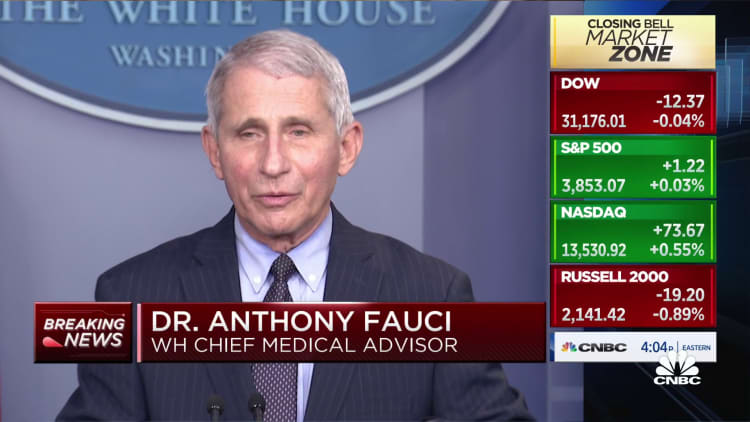
New data shows that the Covid-19 vaccines currently on the market may not be as effective in guarding against new, more contagious strains of the coronavirus, giving "all the more reason" to vaccinate people faster, White House health advisor Dr. Anthony Fauci said on Thursday.
A handful of new strains of the coronavirus have emerged overseas that have given scientists some cause for concern. Some variants that have been identified in the United Kingdom, South Africa and Brazil appear to be more transmissible than previous strains but not necessarily more deadly.
While it's no surprise the virus is mutating, researchers are quickly trying to determine what the changes might mean for recently developed lifesaving vaccines and therapeutics against the disease.
Some early findings that were published in the preprint server bioRxiv, which have yet to be peer reviewed, indicate that the variant identified in South Africa, known as 501Y.V2, can evade the antibodies provided by some coronavirus treatments and may reduce the efficacy of the current line of available vaccines.
"Furthermore, 501Y.V2 shows substantial or complete escape from neutralising antibodies in COVID-19 convalescent plasma," researchers with South Africa's National Institute for Communicable Diseases wrote. Their conclusions, they said, "highlight the prospect of reinfection ... and may foreshadow reduced efficacy of current spike-based vaccines."
Even if the drugs are less effective, they will still likely provide enough protection to make the vaccines worth getting, Fauci said during a White House press briefing.
Both vaccines from Pfizer and Moderna have proven to be highly effective, providing about 95% protection from infection, which creates a "cushion effect" that would allow for some dip in their effectiveness.
"We're following very carefully the one in South Africa, which is a little bit more concerning, but nonetheless not something that we don't think we can handle," Fauci said.
A dip in the vaccines' effectiveness would be "all the more reason why we should be vaccinating as many people as you possibly can." Mutations occur when the virus spreads and replicates itself, which can be suppressed if enough people are inoculated against the disease to build so-called herd immunity, he explained.
"Bottom line: We're paying very close attention to it. There are alternative plans if we ever have to modify the vaccine. That's not something that is a very onerous thing, we can do that given the platforms we have," Fauci said.
The World Health Organization's immunization director, Kate O'Brien, said on Friday that it's too early to have clear information on whether the emerging variants will have an impact on any of the current vaccines. O'Brien added that not every variant will act the same way, and the answer will depend on the type of mutation and the vaccine.
"This is really evolving information and there are a number of ways evaluations can be done to understand whether or not any ... of the vaccines are less effective against the variants," O'Brien said during a press briefing.
Dr. Rochelle Walensky, the new director for the Centers for Disease Control and Prevention, said on Tuesday that while she believes the vaccines will work against the mutated variants, they may not end up as effective as they were in clinical trials.
"I'm really optimistic about how these variants are going to go," Walensky said in an interview with the JAMA Network. "I could be wrong. It could be that we'll find variants and variants may emerge ... where the vaccine is less potent, but I'm still currently optimistic."
Early data
So far, the United States has not detected any cases of Covid-19 with the strain identified in South Africa, Fauci said, though he added that the level of surveillance for the strains "is not at the level that we would have liked."
The research on the new variants is preliminary and limited.
The National Institute for Communicable Diseases used the blood samples from 44 people who previously had Covid-19 to determine if their antibodies worked against the 501Y.V2 variant. The study found that in nearly half of the cases, the neutralizing antibodies were not effective against the new variant, suggesting people may be susceptible to reinfection.
The researchers noted that more large-scale clinical trials will be needed to determine the outcome of the vaccines. They added that "nevertheless, the speed and scope of 501Y.V2 mediated immune escape from pre-existing neutralizing antibodies highlight the urgent requirement for rapidly adaptable vaccine design platforms."
Another study, which has not been peer-reviewed, from Rockefeller University used blood samples from 20 people who had been vaccinated against Covid-19 with either Moderna's or Pfizer's regimen and tested their antibodies against the various mutations. Researchers noticed that with some of the mutations, the antibodies didn't work as well, adding that the mRNA vaccines "may need to be updated periodically to avoid potential loss of clinical efficacy."
"It's a small difference but it is definitely a difference," Rockefeller's Dr. Michel Nussenzweig, who led the study, told the Associated Press.
However, a study printed in bioRxiv by Pfizer and BioNTech's scientists found that their Covid-19 vaccine was likely to be just as effective against the mutated, infectious strain that was discovered in the U.K. The U.S. has identified at least 144 cases with that variant so far, according to recent data from the CDC.
Authors of the study warned that the rapid spread of Covid variants worldwide required "continuous monitoring of the significance of changes for maintained protection by currently authorized vaccines."
— Reuters, the Associated Press and CNBC's Sam Meredith contributed to this report.



